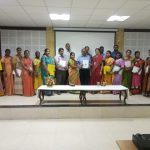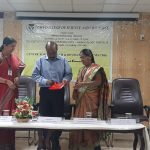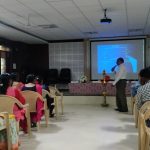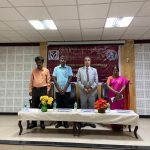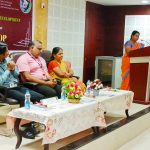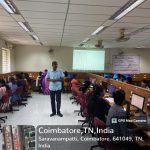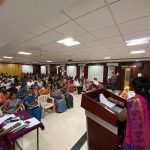- Examinations
- Admissions
- PCS
- IQAC
- Mandatory
- UGC 12-B
- ANNUAL REPORT 24-25
- ADMISSION GUIDELINES
- EXPENDITURE AND INCOME STATEMENT
- TELEPHONE DIRECTORY
- ICC
- GENDER EQUITY
- ANTI-RAGGING
- GRIEVANCE REDRESSAL CELL
- FOR DISABLED LIFT AND RAMP FACILITY
- ADMISSION REFUND POLICY
- AISHIE
- EXTERNAL AUDIT REPORT
- ACADEMIC CALENDAR
- WEEK
- CODE OF CONDUCT
- PROGRAMME OUTCOME
- INSTITUTIONAL PERSPECTIVE PLAN
- STATUTORY BODIES
- Cells and Clubs
- Public Self Disclosure
- RTI Act
- NIRF
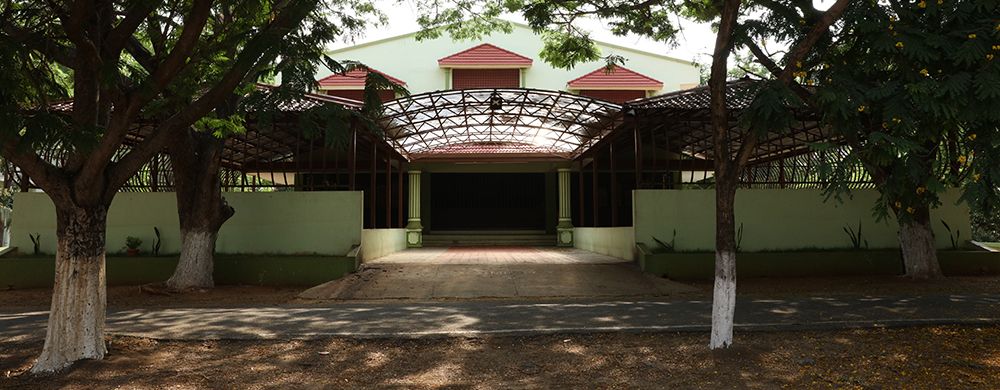
Centre For Research And Development
About CRD
Center for Research & Development (CRD) is initiated to engage faculty, scholars and students to involve in cutting edge research and hope to achieve high levels of excellence through innovations, collaborations and pioneering work.
Objectives
- To encourage faculty members to obtain research-level qualifications.
- To encourage faculty members to present papers and publish research articles.
- To foster research inquisitiveness in students.
- To prioritize the introduction of PG courses and research courses.
- To assist faculty members in preparing documents and submitting research proposals to funding agencies.
- To ensure that sufficient experimental manuals and reference books are made available in the Department Libraries.
- To monitor the process of selection of research scholars via written tests and interviews.
- To serve as the interface between the academic units, and the Principal and Management for planning thrust areas and future direction in research areas.
- To monitor linkages and collaborations with research institutes, hospitals, and Indian and Foreign Universities.
Team Members
Sl.no | Name | Designation | Department |
1 | Dr.B.Sumathi | Associate Professor | Department of Computer Science |
2 | Dr.S.P.Swornambiga | Associate Professor | Department of Computer Applications |
3 | Dr.S.Uma | Associate Professor | Department of Information Technology |
4 | Ms.R.Sunitha | Assistant Professor | Department of Computer Science |
4 | Ms.Vani.K | Assistant Professor | Department of Computer Applications |
5 | Dr.P.MariSelvem | Associate Professor | Department of Commerce |
6 | Dr.M.S.Baby. | Associate Professor | Department of Commerce |
7 | Dr.P.Sini | Associate Professor | Department of Commerce |
8 | Dr.Nithya Devi | Assistant Professor | School of Biological Sciences |
9 | Dr.Iwin C Varkey | Associate Professor | School of Biological Sciences |
10 | Ms.P.Malathy | Assistant Professor | School of Biological Sciences |
11 | Mr.Solai Vijayan | Assistant Professor | Department of Electronics |
12 | Mr.P.Kanibose | Assistant Professor | Department of Mathematics |
13 | Dr.Arulmozhi | Assistant Professor | Department of Food Science & Nutrition |
14 | Dr.P.Mohana | Associate Professor | Department of Languages |
15 | Dr.Anupama | Assistant Professor | Department of MSW |
16 | Dr.P.Kavitha | Assistant Professor | Department of Management |
17 | Dr.Geetha | Assistant Professor | Department of English |
18 | Mr.Arun Kumar | Assistant Professor | Department of Psychology |
Research Policy
- The institution has a well-defined policy to promote research culture among the CMS academic fraternity including faculty and students. A slew of efforts have been initiated in the institution towards the logical culmination of these ends.
- Faculty members who wish to pursue M.Phil or Ph.D will be sanctioned On Duty leave for one day per month for meeting their guide.
- Faculty members who have completed M.Phil will be sanctioned one increment and Ph.D will be sanctioned two increments on completion of their Viva voce examinations successfully.
- Faculty members who have guided Ph.D will be sanctioned one part of the amount after the scholar paid their fee per year.
- Similarly, faculty members who have qualified in SET/SLET/NET examinations will be eligible for one increment.
- Faculty members who receive fees for consultancy assignments can use it for completing their assignment and need not share their remuneration with the Institution unless the Institution’s resources are utilized. In case of utilization of Resources the remuneration will be shared by Institution, Management and faculty consultant with the ratio of 20:60:20 respectively.
- Reward suitably any research publications in reputed journals.
- Grant one increment / two increments on completion of M.Phil or Ph.D programs respectively.
- 50% grant of the registration fees for attending conferences or seminars or workshops on production of participation certificate.
CMS Consultancy Policy
The CMS Board, management as well as the faculty were unanimous in the need for the institution to develop the consultancy services to the corporate world as well as the other stakeholders in the society, at large.
- As a measure of fostering and promoting consultancy at CMS, it was agreed to tap the present academia-institution framework.
- A committee at the college level, named CMS CONSULTANCY COMMITTEE, may be formed under the Centre for Research and Development.
- The committee will be empowered with identification of thrust areas and finalization of MOUs and other formal arrangements of co-operation between the institution and the business world.
Also, the Board agreed that the fruits of the consultancy activity need to be shared with all the individuals involved in this exercise. Accordingly, it was agreed that faculty members who receive fees for consultancy assignments can use it for completing their assignment and need not share their remuneration with the Institution unless the Institution’s resources are utilized. In case of utilization of Resources the remuneration will be shared by Institution, Management and faculty consultant with the ratio of 20:60:20 respectively.
- Faculty members who wish to pursue M.Phil or Ph.D will be sanctioned On Duty leave for one day per month for meeting their guide.
- Faculty members who have completed M.Phil will be sanctioned one increment and Ph.D will be sanctioned two increments on completion of their Viva voce examinations successfully.
CMS Ethics Culture
- Ethics are moral principles to be followed in society. While these questions are very important in the lives of human beings, ethics also play a critical role in the education and academic domains.
- The following code of conduct has been spelt out for use by the entire academic fraternity at CMS. Violations of this code, by any one, will be dealt with strongly and swiftly, without exception.
Plagiarism And Cheating
While the academic fraternity the world over unanimously agree on free sharing and exchange of knowledge, data, information, views, ideas and opinions, they are simultaneously highly critical of any act of plagiarism and cheating.
Plagiarism
Cases of plagiarism are the use of material, ideas, figures, code or data without appropriate acknowledgment or permission (in some cases) of the original source. This may involve submission of material, verbatim or paraphrased, that is authored by another person or published earlier by oneself.
Examples of plagiarism include:
- Reproducing, in whole or part, text/sentences from a report, book, thesis, publication or the internet.
- Reproducing one’s own previously published data, illustrations, figures, images, or someone else’s data, etc.
- Taking material from class-notes or downloading material from Internet sites, and incorporating it in one’s class reports, presentations, manuscripts or thesis without citing the original source.
- Self plagiarism which constitutes copying verbatim from one’s own earlier published work in a journal or conference proceedings without appropriate citations.
Cheating
Cheating is another form of unacceptable academic behaviour and may be classified into different categories:
- Copying during exams, and copying of homework assignments, term papers or manuscripts.
- Allowing or facilitating copying, or writing a report or exam for someone else
- Using unauthorized material, copying, collaborating when not authorized, and purchasing or borrowing papers or material from various sources
- Fabricating (making up) for falsifying (manipulating) data and reporting them in thesis and publications
The following guidelines for academic conduct must be observed by all concerned
- Use proper methodology for experiments/computational work. Accurately describe, compile data.
- Carefully record and save primary and secondary data such as original pictures, instrument data readouts, laboratory notebooks, and computer folders. There should be minimal digital manipulation of images/photos; the original version should be saved for later scrutiny, if required, and the changes made should be clearly described.
- Ensure robust reproducibility and statistical analysis of experiments and simulations. It is important to be truthful about the data and not to omit some data points to make an impressive figure (commonly known as “cherry picking”).
- Lab notebooks must be well maintained in bound notebooks with printed page numbers to enable checking later during publications or patent. Date should be indicated on each page.
- Write clearly in your own words. It is necessary to resist the temptation to “copy and paste” from the Internet or other sources for class assignments, manuscripts and thesis.
- Give due credit to previous reports, methods, computer programs, etc. with appropriate citations. Material taken from your own published work should also be cited; as mentioned above, it will be considered self-plagiarism otherwise.
Activities of CRD
CMS COLLEGE OF SCIENCE AND COMMERCE CENTRE FOR RESEARCH AND DEVELOPMENT
ACTIVITIES FOR THE ACADEMIC YEAR 2022-2023
Sl.no | Date | Programme | Title | Resource Person | No of Participants |
1. | 29-10-2022 FN | Workshop for Research Scholars | Statistics for Research | Dr.R.Velmurugan, Associate Professor of Commerce, Karpagam Academy of Higher Education, Coimbatore | 27 Research Scholars |
2. | 29-10-2022 AN | Faculty Development Programme | Essential Statistical Tools for Research | Dr.R.Velmurugan, Associate Professor of Commerce, Karpagam Academy of Higher Education, Coimbatore | 83 Faculties |
CMS COLLEGE OF SCIENCE AND COMMERCE
CENTER FOR RESEARCH AND DEVELOPMENT
ACTIVITIES FOR THE ACADEMIC YEAR 2021-2022
S. No. | Date | Programme | Title | Resource Person | No of Participants |
1. | 22-3-2022 | Orientation Program For Research Scholars | Research and its significance in Modern Times | Dr.George Dharma Prakash, Associate Professor, School of Computer Science, Engineering and Applications, Bharathidasan University, Tiruchirappalli | 30 Research Scholars |
2. | 23-3-2022 | Time Line Presentation | A Framework for Identification on Research Gap | Dr.N.Eswaran, Vice Principal, KG College of Arts & Science, Coimbatore | 30 Research scholars |
3. | 24-3-2022 | Annual Research Consortium For Scholars Currently Pursuing | Essentials of a Good Research | Dr.R.Rajeswari, Associate Professor, Department of Computer Applications, Bharathiar University, Coimbatore | 30 Research Scholars |
4. | 31-3-2022 | National Level Virtual Faculty Development Programme | Funded research Project proposal | Dr.V.Arulmurugan, Assistant Professor and Research Supervisor, Pondicherry University, Karaikal Campus | 95 Faculty members |
5. | 4-4-2022 | Virtual Faculty Development Programme | Valuing your Intellectual Property Rights | Dr.B.Gayathri, Associate Professor, Department of Computer Science, Bishop Heber College, Tiruchirapalli | More than 150 participants |
6. | 5-4-2022 | Virtual Faculty Development Programme | Introduction to IPR – A guide for Institutions | Ms. Priyadarsini Shanmugam, Partner and Consulting in Patwise consulting solutions | 95 Faculty members, Research scholars and students |
Activities for the year 2020-21
S. No | Type (National/ Internationa l/ Institution level) | Title | Resource person | Date | Number of particip ants |
1 | Webinar | Session I: Topic:Introductio n to Internet of Things, Session II: IoT Application Development | Dr. R. Rajeswari, Associate Professor, Department of Computer Applications, Bharathiar University, COIMBATORE – 641046. | 5.6.2020, 11 am and 6.6.2020, 11 am | 112 |
2 | Webinar | Research Ethics | Dr. P. Saravana kumari, Associate Professor, Department of Microbiology, R.V.S. College of Arts and Science, Sulur. | 5.6.2020, 2 pm | 94 |
3 | Webinar | Virtual reality | Dr. J.Satheeshkumar Associate Professor Department of Computer Applications Bharathiar University Coimbatore | 8.6.2020 , 11 am | 120 |
4 | Webinar | Artificial Intelligence Revolution | Mr.Srinivasa Raghavan Product Developer- R&D SMARTANT TECHNOLOGIES PVT LTD | 9.6.2020 | 146 |
Session –I: Dr. V. Viswanathan, Professor, School of Computer Science and |
5 | Two Day National Level Virtual Workshop | Research and Related Tools | Engineering, Vellore Institute of Technology Chennai Topic:” Explainable AI” Session- II: Dr. Mini Ghosh, Professor, School of Advanced Sciences, Vellore Institute of Technology, Chennai Topic: Exploration of dynamical systems with MATLab, XPP and R Session – III : Dr.Ganesan Ramachandran, Professor, School of Computer Science and Engineering, Vellore Institute of Technology, Chennai Topic:Roadmap for a Security Researcher Session – IV : Dr. S Parvathi, Professor, School of Computer Science and Engineering, Vellore Institute of Technology, Chennai Topic: Social Networking and its applications | 16th and 17th April 2021 between 10am and 1.00pm | 281 Faculties and Research scholars from 11 states of India |
6 | National level Virtual Faculty Development Programme | Funding Opportunities for Research | Dr. C. Paramasivan., Ph.D., D.Lit., Asst. Professor & Research Advisor, Periyar E. V. R. College, Tiruchirappalli | 24 th March 2021 between 11.00am and 1.00 pm. | 480 |
Activities for the year 2019-20
S. No | Type (National/ International / Institution level) | Title | Resource person | Date | Number of participants |
1 | Institution level- workshop | Research Article Writing | Dr. S.Franklin John, Principal, CMSIMS and Dr. G. P. Jayanthi, Director Research and Consultancy, Avinashilingam University, Coimbatore | 29.02.2020 | 94 |
2 | Institution level | Orientation programme | Prof. Dr. B. Murali, Head & Associate Professor, Department of Computer Science, PSG College of Arts & Science, Coimbatore | 06.02.2020 FN | 71 |
3 | Annual Research | Prof. Dr. B. Murali, Head & | 62 |
Institution level | Consortium (ARC) | Associate Professor, Department of Computer Science, PSG College of Arts & Science, Coimbatore | 06.02.2020 AN | ||
4 | One Day Faculty Development Program | Research Proposal Writing | Dr. C. Paramasivan, Professor, PG & Research Department of Commerce, Periyar E.V.R. College(Autonomous), Trichy | 30.11.2019 | 105 |
Activities for the year 2018-19
S. No | Type (National/ International/ Institution level) | Title | Resource person | Date | Number of participants |
1 | orientation programme | orientation programme | Dr. Murali Head, Department of Computer Science PSG CAS | 4.01.2019 | M.Phil and P.hd scholars |
2 | Annual Research Consortium | Annual Research Consortium | Dr. S. Balasubramanian, Dean- Research and Development, Dr. NGP Arts and Science College | 8.1.2019 | M.Phil and Ph.D scholars |

